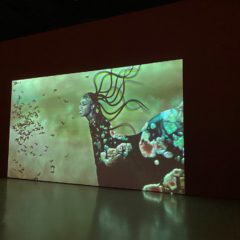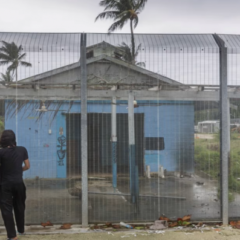Writing Across Worlds
Writing Across Worlds: In Converation with Victor Fernando R. Ocampo When: 28 April 2023, 12:00 — 13:20 Venue: Online Book your place Conversation with prolific Singapore-based Filipino writer Victor Fernando R. Ocampo, on his International Rubery Book Award shortlisted collection The Infinite Library and Other Stories, his influences and writing craft, and the state of speculative fiction in Southeast Asia today. Join us in conversation with prolific Singapore-based Filipino writer Victor Fernando R. Ocampo, on his International Rubery Book Award shortlisted collection The Infinite Library and Other Stories, his influences and writing craft, and the state of speculative fiction in Southeast Asia today. This discussion is hosted online and will be moderated by Malaysian editor and writer Zhui Ning Chang. Victor Fernando R. Ocampo is the author of the International Rubery Book Award shortlisted The Infinite Library and Other Stories (Math Paper Press, 2017; Gaudy Boy, 2021) and Here be Dragons (CANVAS Press, 2015), which won the Romeo Forbes Children’s Story Award in 2012. His writing has appeared in many publications including Apex Magazine, Daily Science Fiction, Future Fiction, Likhaan Journal, Strange Horizons, Philippines Graphic, Science Fiction World and The Quarterly Literature Review of Singapore, as well as anthologies like The Best New Singapore Short Stories, Fish Eats Lion: New Singaporean Speculative Fiction, LONTAR: The Journal of Southeast Asian Speculative Fiction, the Philippine Speculative Fiction series and Mapping New Stars: A Sourcebook on Philippine Speculative Fiction. He is a fellow of the Milford Science Fiction Writers’ Conference and a Jalan Besar writer-in-residence at Sing Lit Station (2020/2021). Zhui Ning Chang is a Malaysian editor, writer, and theatre practitioner based in London, UK. She serves as Fiction Editor at khōréō magazine, and is a co-editor on the Best of Malaysian Short Fiction in English 2010-2020 anthology. Her writing for performance includes queer romcom Seashore Yuanfen and time travel project Asian Pirate Musical; her essays and reviews have appeared in Strange Horizons, The BSFA Review, Library Journal, Fantasy/Animation, and more. Currently, she is a PhD researcher in transnational Southeast Asian speculative literature at Birkbeck, University of London. Featured image generated using...
Leaves are Alive
When: 25 April 2023, 18:00 — 19:20 Venue: Birkbeck 43 Gordon Square Book your place Taking inspiration from Virginia Woolf's Mrs Dalloway, this interactive workshop considers our connection to trees. Taking inspiration from Virginia Woolf's Mrs Dalloway, this workshop considers our connection to trees. Sitting in Woolf's former home surrounded by Gordon Square's impressive plane trees, we will explore what kind of humanarboreal relations can be forged through literary, visual, audio-visual, and acoustic representation. We will handle small sections of the 4,800-year-old "Fenland bog oak" used to create a table for the Diamond Jubilee to inspire and prompt discussion. Come prepared to reflect on your own relationship with trees and help produce a collective creative piece by the end of the session. Mike Bintley is Senior Lecturer in Early Medieval Literature and Culture at Birkbeck. He wrote Trees in the Religions of Early Medieval England (2015), and co-edited Trees and Timber in the Anglo-Saxon World (2013) and the forthcoming collection The Surrounding Forest: Tree as Symbol and Metaphor at the Time of the European Middle Ages. He is currently working on an anthology of translations drawing together plant life and trees in the Old English poetic corpus, entitled Treow Forms: An Anthology of Trees and Plant Life in the Earliest English Poetry. Shani Cadwallender is a poet, teacher, Associate Tutor and part-time CHASE funded PhD student at Birkbeck. Her creative-critical doctoral project, 'Trees Revisited', considers ecological approaches to undisciplining Victorian Studies and the relationship between trees and poetry. She has been published by Dreich Press, Wildfire Words, Ink, Sweat and Tears, Nutmeg magazine and others. Caroline Edwards is Senior Lecturer in Modern and Contemporary Literature at Birkbeck, where she is Director of the Centre for Contemporary Literature. She is author of Utopia and the Contemporary British Novel (Cambridge University Press, 2019), co-editor of China Mieville: Critical Essays (Gylphi, 2015) and Maggie Gee: Critical Essays (Gylphi, 2015) and editor of The Cambridge Companion to British Utopian Literature and Culture, 1945-2020 (forthcoming). Caroline is currently writing her second monograph, Hopeful Inhumanism: The Elemental Aesthetics of Ecocatastrophe, which examines hopeful moments of inhuman collaboration within the elemental contexts of the lithic, the mycological, the arboreal, and the hydrological. Matt Mead is a furniture maker and writer, working at the intersections of craft, cultural history, and phenomenology. His writing has appeared in Cabinet, Hinterland, Photography and Culture and elsewhere. In 2010, he completed a PhD in Critical Theory at the University of Nottingham. He currently works at Jan Hendzel Studio, which focuses on producing expressive furniture from sustainable and reclaimed British timbers. He lives in London and can be found @other_objects. Featured image by Lex Melony on...
The Black Fantastic: Ekow Eshun in Conversation
with Ekow Eshun and Dr Caroline Edwards Friday 24th February 2023, 6-8pm, Keynes Library, 43 Gordon Square, Bloomsbury, London WC1H 0PD Please book your free ticket here. How are contemporary Black artists reimagining fantastic genres and motifs to address racism and social injustice? How do elements of folklore, science fiction, spiritual traditions, ceremonial pageantry and Afrofuturism inform multimedia Black art today? What can we learn from their powerful visions of futurity? We are thrilled to be joined by Ekow Eshun for a special session on the Black Fantastic. Eshun's recent exhibition "In the Black Fantastic," which ran from June to September 2022 at the Hayward Gallery, brought together contemporary artists from the African diaspora, whose work draws on science fiction, myth and Afrofuturism. Featuring artists such as Nick Cave, Sedrick Chisom, Ellen Gallagher, Wangechi Mutu, Chris Ofili, Lina Iris Viktor and Kara Walker, "In the Black Fantastic" was the UK’s first exhibition dedicated to the work of Black artists working in the realm of the fantastical – including mythology, folklore, spiritual traditions, science fiction and Afrofuturism – to explore racial injustices and identity. Eshun will reflect on his experiences curating this acclaimed exhibition and discuss how Black artists are exploring the fantastic across a variety of media. Ekow Eshun is a Ghanaian-British writer, editor and curator. He has been the editor of numerous magazines, including Tank, Arena and Mined. He was Artistic and Executive Director of the Institute of Contemporary Arts, London (2005-10), during which time visitors rose by 38%. He holds an honorary doctorate from London Metropolitan University and is Chairman of the Fourth Plinth Commissioning Group, overseeing London's most significant public art programme. He writes frequently for the Guardian, Independent on Sunday, The Face and the Observer. He is a regular contributor to BBC Radio 4 arts shows Saturday Review and Front Row. Eshun's Orwell Prize-nominated memoir, Black Gold of the Sun: Searching for Home in England and Africa (2005) explores issues of race and identity. In 2016, he curated a group exhibition at The Photographers’ Gallery, London exploring the identity of the black dandy, Made You Look: Dandyism and Black Masculinity. In 2017, he edited the publication Africa Modern: Creating the Contemporary Art of a Continent, which marked the opening of Cape Town’s Zeitz Museum of Contemporary Art Africa. He is also Chairman of Trafalgar Square’s Fourth Plinth Commissioning Group, and Creative Director of the arts space Calvert 22 Foundation, for which he has instigated an award-winning online magazine, The Calvert Journal. Please book your free ticket here. Venue information available here. Featured image: photograph of Wangechi Mutu's "The End of Eating Everything" (short film, 2013) taken by Dr Caroline Edwards at the "In the Black Fantastic" exhibition, Haywood Gallery London, September...
SF & Extraction Conference CFP
SF & Extraction: LSFRC 6th annual conference 8-9 October 2022, Online Keynote speakers & Guest creators TBC. We're delighted to be supporting the 6th annual conference of the London Science Fiction Research Community, which returns in October 2022 as an international, two-day online event. Situating Extraction As Earth burns, capital continues to plunder more and more material with which to fuel its own destructive growth. ‘Extraction’ entails the removal – usually forcible – and conversion of the human and inhuman into marketable materials. In so doing, nature as such becomes implicated in human politics across a variety of tangled, exploitative confluences. Extraction is an imperialist, (neo)colonialist practice that has been wreaking havoc on life for over five hundred years, as resources and people are extracted from the Global South and profit accumulated in the Global North. It undergirds capitalism’s model of success-through-progress, occupying and controlling the horizons of past history, present conditions and future possibility. Extraction, then, insists that alternative ways of being-in-the-world do not matter, excluding, exploiting and destroying lives in order to keep the engines of eternal growth burning brightly. For the past two centuries, extraction has built a world petroculture, a global energy system that has caused disastrous damage to the planet’s climate and circumscribed social and cultural imaginaries. It is imperative that we find ways to conceive of futures free of extractive hegemony and the technofix solutions it proposes to the problems it causes. Sf builds new worlds, sometimes from the same components that constitute our present reality, sometimes with alternative ingredients and values toward more just and equitable ways of being. Its origins as a genre are colonialist and imperial, and its close affinity for the dominant technoculture remains ongoing. In spite of this – or, rather, precisely because of this – sf is uniquely effective as a mode of imagining capable of destabilising the binaristic divisions (nature/culture, first nature/second nature, centre/periphery) that underscore extractive thinking and practice. Sf has often been a genre of technical and personal mastery, but is increasingly a space for vulnerability, inclusion and change, of finding ways out of the historical nightmare that is being differentially forced upon us. The SF + Extraction Conference For our 2022 conference, the LSFRC welcomes submissions that explore the theme of Science Fiction + Extraction. We invite proposals for papers, panels, workshops, performances, and creative responses to the theme, and we would like to actively encourage alternative and innovative forms of presentation and engagement. It is our view that the theme of Extraction is urgent and at the same time broad and receptive to diverse interpretations. We welcome contributions that think with,...
Migration & Documentality
Migration & Documentality: Collaborative Thinking and Social Justice A collaborative and interactive panel talk on issues of contemporary migration, documentality and social justice. Wed, 22 Jun 2022, 20:00 BST (free event, booking required) Goodenough College, Mecklenburgh Square, London WC1N 2AB This panel discussion features Dr Henghameh Saroukhani (Saint Mary’s University, Canada) and Dr Agnes Woolley (Birkbeck, University of London) who will be discussing their current collaborative work on migrant life, documentality and genre-bending writing. Their conversation will examine the radical journalistic prose of the Iranian-Kurdish writer Behrouz Boochani who wrote about his imprisonment on Manus Island entirely on WhatsApp alongside the neglected archival material required to fully understand the morbid injustices associated with the recent Windrush scandal. They will discuss the nature of collaborative thinking, embodied research practices and the ethics of writing about illegalized and 'undocumented' lives. This talk encourages feedback and sharing from audience members so as to facilitate a space of intellectual affinity, solidarity and alliance. Supported by the Birkbeck Institute of the Humanities, the Centre for Research on Race & Law (Birkbeck), and The Decolonial Group (GoodEnough). Contact information: henghameh.saroukhani@smu.ca and/or a.woolley@bbk.co.uk. Click here to book your free place at this event. Featured image from Chauka, Please Tell Us the Time (Dir. Behrouz Boochani,...
Futurisms in Contemporary Turkey
4 July 2022, 6pm, The Keynes Library, 43 Gordon Square, Bloomsbury, London, WC1H 0PN Attendance is free, but booking is required. This talk will introduce scholarship on speculative fiction and futuristic narratives in Turkey and give a historical and literary survey of the tradition of entangled futurities and speculative worldbuilding in contemporary Turkish Literature. Discussion of the selected primary texts will illustrate the intellectual and academic interest in contemporary Turkey and the common concerns and themes portrayed in Turkish literature. Dr Emrah Atasoy is the author of the monograph Epistemological Warfare and Hope in Critical Dystopia (2021) and several articles and book chapters on speculative fiction, futuristic narratives, Turkish speculative fiction, ecocriticism, twentieth-century literature, and comparative literature. He is currently a visiting postdoctoral scholar at the Faculty of English, University of Oxford, as a recipient of the TUBITAK (The Scientific and Technological Research Council of Turkey) 2019 International Postdoctoral Research Fellowship Grant. Please click here to book your place. Featured image taken by Emrah Atasoy....









Recent Comments